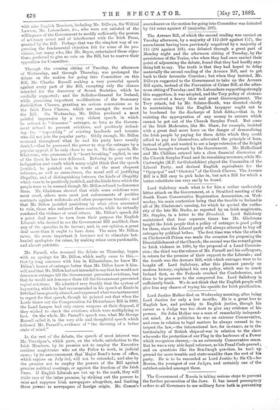Through the evening sitting of Tuesday, the afternoon of Wednesday,
and through Thursday, was prolonged the debate on the motion for going into Committee on this Bill, Mr. Charles Russell making a very powerful speech against every part of the Bill, excepting only the clauses intended for the discovery of Secret Societies, which he cordially supported ; and the Solicitor•General for Ireland, while promising important modifications of the Summary Jurisdiction Clauses, granting no serious concessions as to the Irish Press Clauses, which are amongst the worst in
the Bill. On Wednesday, Mr. Dillon produced a most painful impression by a very violent speech, in which he refused to " denounce " outrages, so long as the Govern- ment refused to prevent evictions, and positively defend- ing the boycotting " of evicting landlords and tenants who did not join the popular party. Oddly enough, Mr. Dillon assumed throughout what he and his party have usually denies,—that he possessed the power to stop the outrages by a popular appeal, if he only chose to use it. To this speech, Mr. Gladstone, who pronounced it " heart-breaking," replied, in one of the finest he has ever delivered. Refusing to pour out the indignation and wrath which many might think that the speech justified, he pointed out, in words of the most eloquent reticence, as well as earnestness, the moral evil of justifying illegality, and of distinguishing between the kinds of illegality which were to be positively justified, and the kinds from which the people were to be weaned though Mr. Dillon refused to denounce them. Mr. Gladstone showed that while some evictions were most cruel, others were most just enforcements of positive contracts against well-to-do and often prosperous tenants ; and that Mr. Dillon justified punishing by what often amounted to ruin, those who enforced these contracts, while he virtually condoned the violence of cruel crimes. Mr. Dillon's speech did a great deal more to turn from their purpose the English Liberals who desired to see the Government Bill modified, than any of the speeches in its favour ; and, in our opinion, a great deal more than it ought to have done. The more Mr. Dillon raves, the more important it becomes not to stimulate hot- headed apologists for crime, by making crime seem pardonable, and almost patriotic.


































 Previous page
Previous page